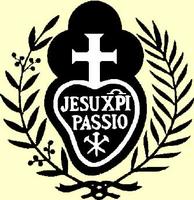Who are the Passionists? (by Todd)
 Our volunteer organization, the Passionist Volunteers International, is run by the Passionists, an order of Roman Catholic priests. I myself had never heard of them before I applied to their program, so here's some information.
Our volunteer organization, the Passionist Volunteers International, is run by the Passionists, an order of Roman Catholic priests. I myself had never heard of them before I applied to their program, so here's some information.The Passionists are a religious order of priests within the Catholic Church (like the Jesuits or the Franciscans). What that means is that they are not necessarily in charge of parishes or churches. Instead they receive duty assignments from superiors within the Passionist order, which is based in Rome.
The Passionist order was founded in 1725 by St. Paul of the Cross (check out his life story). The Passionists' charism - the particular gift they seek to bring to the world - is to keep alive the memory of Jesus' Passion. (Jesus' Passion refers to his suffering, death, and resurrection).
The tasks performed by the Passionist derive from their charism. In particular, the Passionists try to see the image of the crucified Jesus in the poor and suffering of the world. They see Jesus' crucifixion as a call to heed and care for the poor. Through prayer and service, the Passionists minister to the marginalized throughout the world.
So how does this all apply to us, the volunteers in Honduras? It means we're going to Honduras to serve the poor and suffering, and to try to see Jesus in them. There's ample precedent - the Passionists have priests in almost 60 countries throughout the world. They spent about ten years in Honduras from around 1983 to 1993.
One more thing that's particularly important to us as Passionist volunteers: the idea of accompaniment. Accompaniment is a way of relating to those we serve; it means that we're they're to walk with them and develop relationships with them. The idea is that it's more important to be with the people than to just throw aid at them, and that the service is just as much in the relationships you develop as in the tangible services you provide.
Well, this was a lot of writing. I hope it wasn't too boring for everyone! If you'd like to find out more about the Passionists, look here (it's a really good read!).
PS
The picture at the top of this post is the Passionist insignia. The words, "JESU XPI PASSIO" mean "the Passion of Jesus Christ" in the languages Hebrew, Greek, and Latin, respectively - the languages of the early church.

0 Comments:
Post a Comment
<< Home